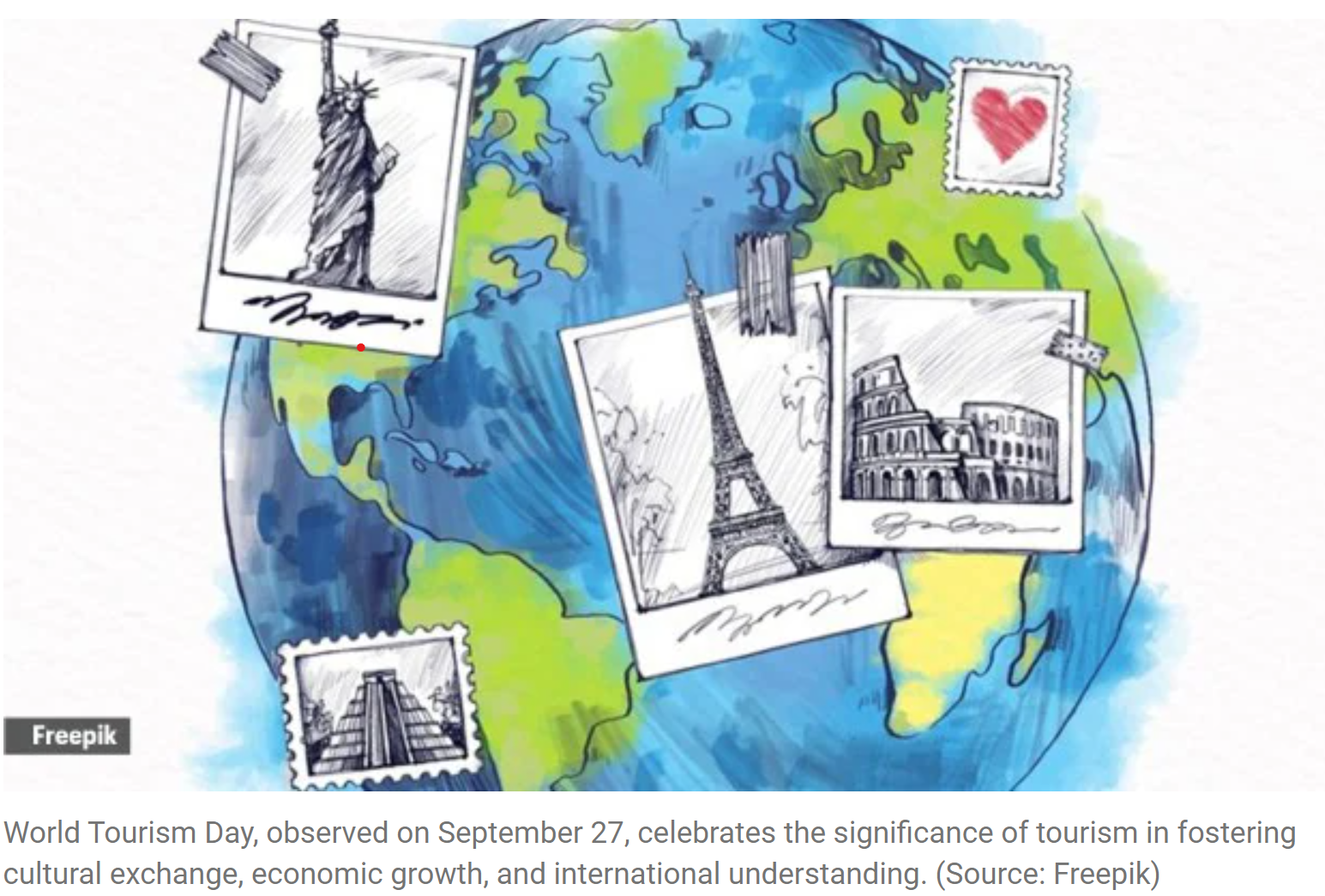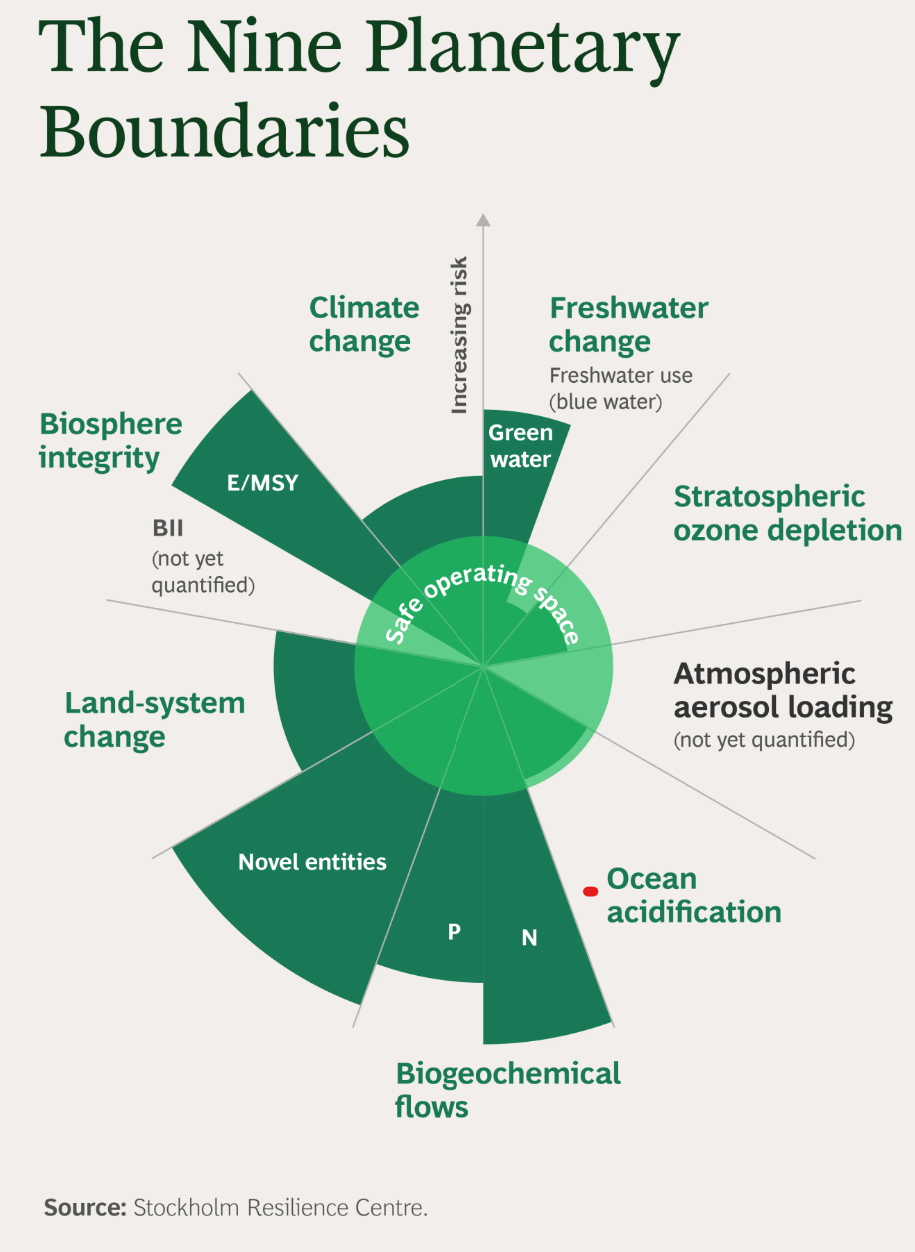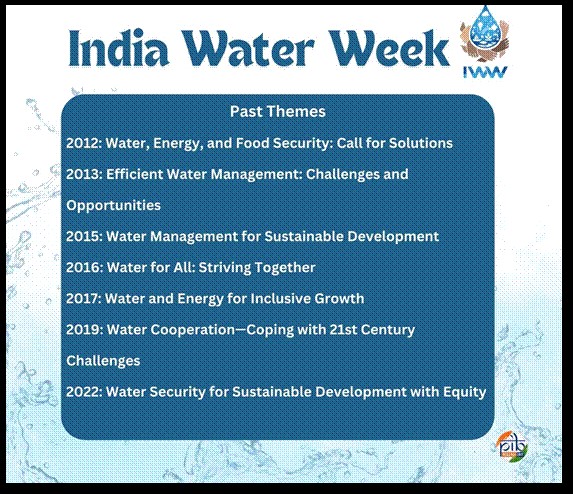WORLD TOURISM DAY 2024

- 27 Sep 2024
In News:
The Ministry of Tourism celebrated World Tourism Day on September 27, 2024, under the theme “Tourism and Peace.” The focus was on how tourism fosters global peace by encouraging cross-cultural interactions and understanding.
Key Details:
- World Tourism Day, established in 1980 by the United Nations World Tourism Organisation (UNWTO), celebrates the global impact of tourism and raises awareness about its economic, social, and cultural significance.
- This day celebrates the diverse experiences that tourism offers and commits to making travel more inclusive, sustainable, and beneficial for all; here’s all you need to know about the day.
- The date, September 27, was chosen to commemorate the adoption of UNWTO statutes in 1975
- The theme for World Tourism Day 2024 is “Tourism and Peace,” which will highlight the association between tourism and world peace, with the United Nations emphasising the significance of comprehending diverse cultures and encouraging sustainable tourism.
World Tourism Day: Significance and Celebrations
- World Tourism Day is a global event that celebrates the role of tourism in bridging cultural gaps, enhancing mutual understanding, and driving economic development.
- It focuses on responsible tourism practices, celebrating diverse cultural heritage, and addressing environmental sustainability and fair distribution of benefits.
- Events include seminars, workshops, and conferences on the theme of the year, cultural festivals, exhibitions, and public performances.
- Educational campaigns and community outreach activities raise awareness about responsible travel, supporting local economies, and protecting natural environments.
Note:
- The World Economic Forum, in its recently released Travel and Tourism Development Index (TTDI), shares the top countries gaining popularity in the travel and tourism industry.
- Notably, in Southeast Asia, India ranks 39th as the TTDI’s top lower-middle-income economy. India’s strong Natural (6th), Cultural (9th) and Non-Leisure (9th) resources drive its travel industry, with the country’s being only one of three to score in the top 10 for all the resources pillars.
- The TTDI measures the set of factors and policies that enable the sustainable and resilient development of the T&T sector, which in turn contributes to the development of a country. Among the 119 countries, here are the top 10 countries for travel and tourism in 2024 attracting travellers from all over the globe.
GlobE Network

- 27 Sep 2024
In News:
- India was elected to the 15-member GlobE Steering Committee on September 26, 2024, in a plenary session in Beijing. The election involved a multistage voting process.
- Role and Significance:
- India will play a vital role in shaping the global agenda on corruption and asset recovery.
- The Central Bureau of Investigation (CBI) highlighted India's expertise in combating corruption as a significant asset for the GlobE Network.
- About the GlobE Network:
- The Global Operational Network of Anti-Corruption Law Enforcement Authorities (GlobE Network) is a G-20 initiative, supported by India since 2020.
- Officially launched on June 3, 2021, during a UN General Assembly session against corruption.
- Currently comprises 121 member countries and 219 member authorities.
- Governance Structure:
- The Ministry of Home Affairs (MHA) serves as the central authority for India within the GlobE Network.
- Indian member authorities include the CBI and the Enforcement Directorate (ED).
- The Steering Committee consists of one chair, one vice-chair, and 13 members providing leadership and direction.
- Functionality and Objectives:
- The GlobE Network facilitates the sharing of best practices, criminal intelligence, and strategy development among international agencies to combat corruption.
- It is supported by the United Nations Office on Drugs and Crime (UNODC), which provides secretariat services.
- G-20 Presidency Initiatives:
- During India’s G-20 Presidency in 2023, two high-level principles for combating corruption were adopted, emphasizing the use of the GlobE Network to enhance global cooperation.
PLANETARY BOUNDARIES AND OCEAN ACIDIFICATION

- 27 Sep 2024
In News:
A new report from the Potsdam Institute for Climate Impact Research (PIK) indicates that the world's oceans are nearing critical acidity levels.
- Key Findings:
- Nine Crucial Factors: The report identifies nine essential elements for sustaining life on Earth.
- Exceeded Limits: Six of these factors have already surpassed safe limits due to human activities.
- Ocean Acidification: This is poised to become the seventh boundary breached.
- Crossed Boundaries:
- Factors Affected:
- Climate change
- Loss of natural species and habitats
- Depletion of freshwater resources
- Increase in pollutants, including plastics and agricultural chemicals
- Factors Affected:
- Causes of Ocean Acidification:
- Primarily driven by rising carbon dioxide (CO2) emissions from burning fossil fuels (oil, coal, gas).
- Implications of Acidification:
- Damage to corals, shellfish, and phytoplankton, disrupting marine ecosystems.
- Threats to food supplies for billions of people.
- Reduced capacity of oceans to absorb CO2, exacerbating global warming.
- Ozone Layer Status:
- Currently not close to being breached; showing recovery since the banning of harmful chemicals in 1987.
- Air Quality Concerns:
- A ninth boundary related to particulate matter is near danger limits.
- Improvements in air quality are noted, but industrializing nations still face pollution risks.
- Tipping Points:
- Crossing these boundaries could lead to irreversible and catastrophic consequences for humanity and future generations.
- All boundaries are interconnected; breaching one can destabilize the entire system.
- Opportunities for Solutions:
- Addressing critical issues, such as limiting temperature rise to 1.5 degrees Celsius above pre-industrial levels, can have widespread benefits across multiple environmental challenges.
Planetary boundaries
- The planetary boundaries were introduced in 2009 to define the global environmental limits within which humans can safely live.
- Johan Rockström, former director of the Stockholm Resilience Centre, led a group of 28 renowned scientists to identify the nine processes that regulate the stability and resilience of the Earth system.
- Climate Change: Greenhouse gas concentrations, primarily CO2, are the primary metric here. Exceeding the recommended levels risks amplifying global warming.
- Ocean Acidification: Oceans absorb CO2, leading to decreased pH levels. This boundary measures the carbonate ion concentration, vital for marine life like corals.
- Stratospheric Ozone Depletion: The ozone layer protects life from harmful ultraviolet radiation. This boundary emphasizes the ozone concentration in the stratosphere.
- Nitrogen and Phosphorus Cycles: Excess nitrogen and phosphorus, often from fertilizers, can disrupt ecosystems. Here, the focus is on their flow into the environment.
- Freshwater Use: Freshwater is vital for life. This boundary pinpoints the annual consumption of freshwater resources.
- Land-System Change: As we modify landscapes, particularly through deforestation, we alter habitats and carbon storage capabilities. This threshold concerns the amount of forested land remaining.
- Biodiversity Loss: Biodiversity underpins ecosystem resilience. This metric observes the extinction rate of species.
- Atmospheric Aerosol Loading: Aerosols influence climate and human health. This boundary examines their density in the atmosphere.
- Chemical Pollution: Synthetic chemicals can harm ecosystems and human health. This boundary reviews their concentration and spread.
INDIA WATER WEEK (IWW) 2024

- 27 Sep 2024
In News:
- The 8th edition of India Water Week (IWW) 2024 was held from September 17-20, 2024, at the Bharat Mandapam in New Delhi.
- Organized by the Ministry of Jal Shakti, this prestigious international event has established itself as a key platform for collaboration in water resource management.
- With participation from global water experts, government leaders, and private-sector representatives, the event aimed to address the critical challenges of water management, foster innovation, and promote sustainable water practices.
Theme and Focus
The theme for India Water Week 2024 was "Partnerships and Cooperation for Inclusive Water Development and Management." This theme underscored the importance of cross-sectoral and international collaboration to address the 21st-century's growing water challenges and the need for integrated efforts in water conservation, management, and equitable access to water resources.
India Water Week: An International Forum
- Since its inception in 2012, India Water Week has grown into a pivotal event in global water diplomacy, offering a platform for dialogue, innovation, and knowledge sharing.
- Each edition focuses on a specific water-related issue, providing policymakers, experts, and industry leaders the opportunity to present solutions and explore cooperative strategies.
International WASH Conference
- A key highlight of IWW 2024 was the International WASH Conference, organized by the Department of Drinking Water and Sanitation (DDWS), Ministry of Jal Shakti.
- This conference focused on global collaboration in Water, Sanitation, and Hygiene (WASH), aiming to address pressing sanitation challenges and promote hygiene standards.
- The conference was held between 17th-19th September 2024, in New Delhi. This three-day gathering, centered on the theme ‘Sustaining Rural Water Supply’, offered a platform for knowledge exchange, showcasing innovations, and sharing best practices aimed at addressing global WASH challenges, with a special focus on achieving Sustainable Development Goal 6 (SDG 6).
Key Takeaways from India Water Week 2024
The India Water Week 2024 concluded with several important takeaways:
- Collaboration and Cooperation: Water security can only be achieved through partnerships across sectors and borders.
- Innovation in Water Management: Startups and technological innovations are key to addressing the future challenges of water resource management.
- Community Participation: Local communities play a crucial role in water conservation efforts, and their involvement is vital to achieving sustainable development.
- Policy Recommendations: The event produced several policy recommendations for sustainable water governance, addressing challenges in climate resilience, infrastructure development, and groundwater management.
Conclusion
India Water Week 2024 was a landmark event that brought together a diverse group of stakeholders to address the complexities of water management in the 21st century. The event paved the way for a more sustainable and inclusive approach to water development through partnership, cooperation, and innovation, ensuring equitable access to water resources for all.
PARAM Rudra Supercomputers

- 27 Sep 2024
In News:
Recently, the Prime Minister of India launched three Param Rudra Supercomputing Systems and a High-Performance Computing (HPC) system for weather and climate research via a virtual event.
PARAM Rudra Supercomputers
- Development: Indigenously developed under the National Supercomputing Mission.
- Deployment Locations:
- Delhi: Inter University Accelerator Centre (IUAC) focuses on material science and atomic physics.
- Pune: Giant Metre Radio Telescope (GMRT) will explore Fast Radio Bursts (FRBs) and other astronomical phenomena.
- Kolkata: S N Bose Centre drives advanced research in physics, cosmology, and earth sciences.
High-Performance Computing (HPC) System
- Purpose: Tailored for weather and climate research.
- Location:
- Indian Institute of Tropical Meteorology (IITM), Pune.
- National Center for Medium Range Weather Forecast (NCMRWF), Noida.
- System Names: 'Arka' and 'Arunika', reflecting their solar connection.
Significance of the HPC System
- Enhanced Predictive Capabilities:
- High-resolution models improve accuracy and lead time for: Tropical cyclones, Heavy precipitation, Thunderstorms, Hailstorms, Heat waves, Droughts and Other critical weather phenomena
National Supercomputing Mission (NSM)
- Launch and Goals
- Launched in 2015 to position India among world-class computing power nations.
- Aims to connect national academic and R&D institutions with a network of over 70 high-performance computing (HPC) facilities.
- Implementation
- Managed by the Department of Science and Technology (DST) and the Department of Electronics and Information Technology (DeitY), Government of India.
- Estimated cost: Rs 4,500 crore over 7 years.
- Supports initiatives like 'Digital India' and 'Make in India'.
- Current Status
- India ranks 74th globally in supercomputing, with only 9 supercomputers out of more than 500 worldwide.
- The mission addresses the growing computing demands of the scientific community and aligns with international technology trends.
- Infrastructure and Networking
- Envisions a supercomputing grid with over 70 HPC facilities networked via the National Knowledge Network (NKN).
- NKN connects academic institutions and R&D labs through a high-speed network.
